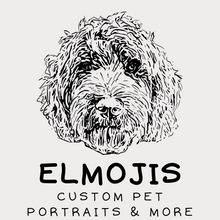Much more than fashion, organic and eco-responsible textiles have become an important part of clothing manufacturing in the last few years.
At Elmojis, we are sensitive to ecological issues and we know that there is still a long way to go for the textile industry to become a totally environmentally friendly sector.
However, we felt it was important to participate in the efforts undertaken by some brands to make their clothing (or accessories) "clean" while respecting the working conditions of the workers in their factories.
Organic, yes, but why?
Don't you feel that the media is telling you more and more often that clothing trends have changed? That you have to update your wardrobe at all costs? That's what fast fashion is all about: everything is faster, everything is more disposable than it was a few years ago. And with good reason: according to a study by the Ellen MacArthur Foundation, the life span of clothes - i.e. the number of uses per item before it is thrown away - has dropped by 36% in the last 15 years. Experts estimate that most clothes will be discarded within a year of purchase, after only 7 to 10 uses. This is due to ever-changing trends as well as a drastically reduced quality of clothing to meet decreasing production costs.
In order to counteract this (unfortunately) growing phenomenon, Elmojis has chosen to offer clothing and accessories made from materials that are much more eco-responsible than what we are used to seeing in recent years: organic cotton and recycled cotton and polyester.
The use of organic cotton minimises the negative impact of the textile industry on the environment: its production does not require the use of pesticides, insecticides or chemical products and its cultivation requires less water thanks to the richness of its soils, which allow water to be better retained.
Recycled materials, on the other hand, are good for our planet for another reason: they contribute to a circular vision of the textile industry, where, rather than ending up as waste, the fibre is reused and thus avoids the highly polluting and resource-intensive cultivation of raw materials.
This commitment to the good of our planet is verified and guaranteed by the organic cotton and recycling labels that our products have:
Oeko Tex - OCS 100 - GOTS - OCS Blended - GRS

What about the human element?
Human welfare is something that needs to be taken into account. At Elmojis, we want to be transparent about the origin of our products. We don't hide the fact that most of the clothes we offer for customisation come from Bangladesh, a mecca for the textile industry. Obviously, the country does not have the same labour code as EU countries for example. Conditions and working hours are not the same, unfortunately.
However, this situation seems to be in constant evolution; whereas 20 years ago it was one of the poorest countries in the world, Bangladesh is now the 41st largest economy in the world, promising a more engaging future for its people.
We also make it a point to only work with partners who guarantee healthy working conditions for the workers in their factories. How can this be verified? Thanks to the label of the Fair Wear Foundation, a foundation created in 1999 in the Netherlands.

The latter is at the origin of a real code of working conditions in companies. To obtain this label, textile manufacturers must respect several rules, including the non-exploitation of children through work (the average legal age for work being 15 years), the right to free association and trade union freedom, wages corresponding to a subsistence minimum, regulation of working hours as well as one day off every 7 days.
These principles seem natural in The Netherlands, yet they are far from being established elsewhere in the world. This label is a real guarantee of the quality of work in textile factories. The controls are frequent, as they are carried out every year by independent experts.
At Elmojis, compliance with this code of conduct is one of the main criteria for selecting our partners, because people are an integral part of our environment and we believe it is essential to do everything possible to contribute to their well-being.
When choosing our products, we naturally turned to a brand which ONLY offers ecologically made clothes and is a pioneer in the world of fashion since 2012.
Made mainly in Bangladesh in five GOTS-certified factories audited by the Fair Wear Foundation, our clothes are produced under conditions from the strictest environmental labels on the market throughout its production chain.
They hold the GOTS (Global Organic Textile Standard) label, which is the most demanding certification for textiles made from organic fibres. It controls the entire production chain right down to the cotton field. It certifies that the cotton is grown without GMOs or chemicals and ensures that the social standards of the World Labour Organisation are respected.
Even the polyester, which is used in addition to organic cotton for some sweaters, is recycled.
Everything is designed to be as waste-free as possible and to make the production of textiles as clean as possible.
If there were three words to describe our clothing: they would be comfort, durability and quality.
There really is something for everyone, always with the utmost respect for our planet.

